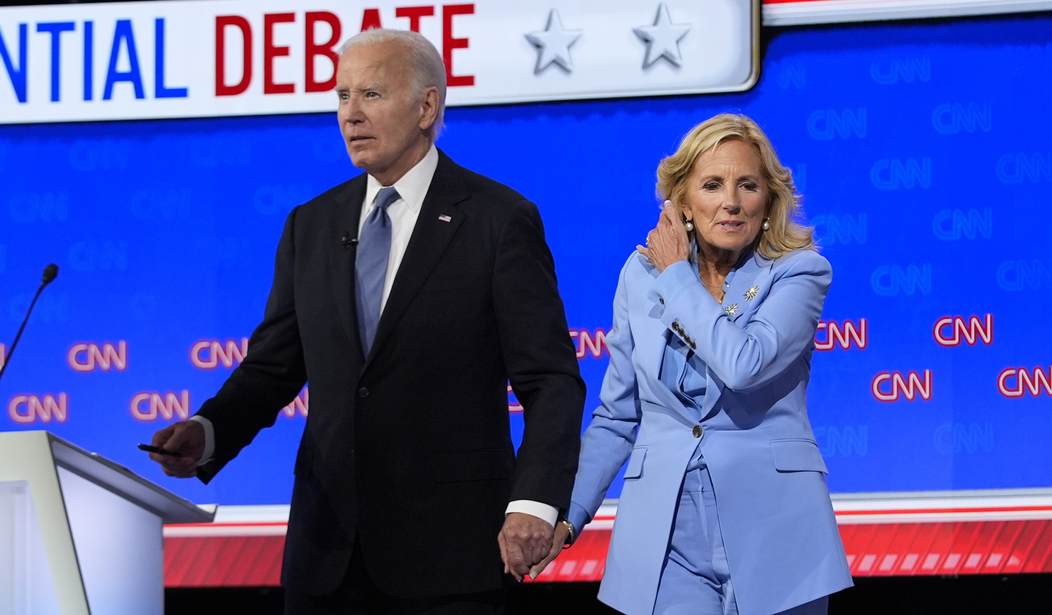What was scheduled to simply be the first debate between Donald Trump and Joe Biden rapidly became a full-blown political crisis after Biden's manifest collapse into incoherence on stage. Within hours of the exhibition, stalwart Democratic publications like The Atlantic and multiple New York Times authors were imploring Biden to step down.
Mark Leibovich wrote, "Biden needs to step aside—for the sake of his own dignity, for the good of his party, for the future of the country." In the New York Times, Tom Friedman penned, "I watched the Biden-Trump debate alone in a Lisbon hotel room, and it made me weep. I cannot remember a more heartbreaking moment in American presidential campaign politics in my lifetime ... he must bow out of the race." Frank Bruni, a contributing opinion writer who was on the staff of NYT for more than 25 years, led with the line, "Biden cannot go on like this."
But from the moment the debate began, he seemed unsteady. Off. His expression was often frozen. His voice was often flat. He garbled words. He corrected himself midsentence, over and over again. He’d clearly memorized key talking points — key phrases — but he repeatedly used them without providing adequate context, swerved from one to another without any transition, halted sentences before they reached their destination, started sentences without giving them any bearings. Ten minutes in, I had a knot in my stomach. Twenty minutes in, the knot was so tight, it hurt. “We finally beat Medicare,” he said early on, and I had no idea what he was talking about.
Nor did anyone else. It gradually dawned on even Biden's staunchest supporters that there was nobody home in the Oval Office. If there once was, he had left the building. Many were probably taken aback by the rapidity with which Joe Biden's support melted away. "I am honestly surprised how quickly Dems have abandoned Biden. I didn’t think their backing of him was shakable so long as he didn’t literally die up there," wrote Max Abrahms.
But many had long suspected, even if they were afraid to say so. It was America's own Ceausescu moment—the instant that occurs when everyone realizes that what they've all been secretly thinking for a long time is true. Democratic voters festively gathered at halls to watch the debate with no love for Donald Trump and suddenly found themselves so horrified some left the building. "It’s frightening," reported the New York Times.
As if to make it official, the Gray Lady wrote in News Analysis: "President Biden’s shaky, halting debate performance has Democrats talking about replacing him on the ticket."
Some, like myself, were less frightened than angry. How could any group of high officials be so irresponsible as to conceal such a material disability in America's chief executive? Part of me wanted to yell, "You're all SOBs. You put an impaired old man in the pilot's seat of an airplane with 350 million passengers so you could keep your crummy jobs. How could you?"
But Andrew McCarthy hit exactly the right note when he observed on Twitter: "This was a terrible night for the country. And Trump aside, no matter what Dems do, Biden is POTUS for [the] next 7 months. Every enemy of the United States knows that. Perilous time." Political journalists write that "Senior Dems are moving on Biden. It's over. They believe they can persuade him out of the race perhaps by as early as next week. If Biden resists, they move on him publicly." But in the meantime, as Andy McCarthy observed, there is no president. The public saw that for itself. In a world with war in Eastern Europe, war in the Middle East, and tension with China in the Western Pacific, there is no one at home at 1600 Pennsylvania Avenue.
Back in the 20th century, at a moment as uncertain as this, Winston Churchill recalled a piece of doggerel from his youth. Quoted in reference to 1930s appeasement in The Gathering Storm, Winston Churchill recalled the poem by Edward Milliken from Punch, 4 October 1890, following a train wreck blamed on a sleeping crewman. It symbolized a whole world careening toward disaster.
Who is in charge of the clattering train?
The axles creak, and the couplings strain.
Ten minutes behind at the Junction. Yes!
And we’re twenty now to the bad—no less!
At every mile we a minute must gain!
Who is in charge of the clattering train?Why, flesh and blood, as a matter of course!
You may talk of iron, and prate of force;
But, after all, and do what you can….
Man is in charge of the thundering train!
In this case, the driver is Joe Biden, who, like the fustian-clad locomotive engineering in Milliken's poem, is worn down by time, his wits insensible to the danger, who is in charge of the clattering train.










